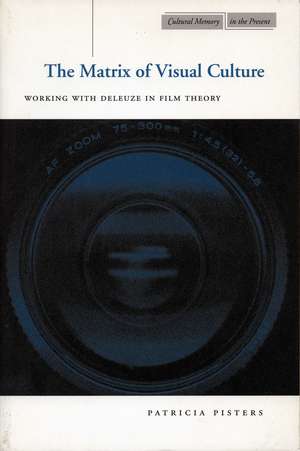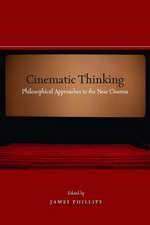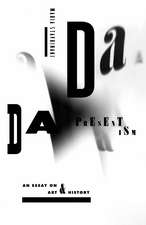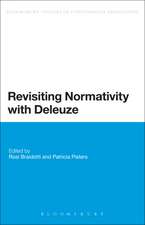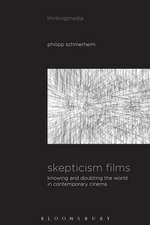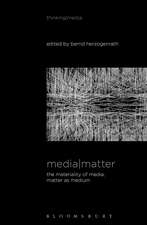The Matrix of Visual Culture: Working with Deleuze in Film Theory: Cultural Memory in the Present
Autor Patricia Pistersen Limba Engleză Paperback – 23 iul 2003
This book explores Gilles Deleuze's contribution to film theory. According to Deleuze, we have come to live in a universe that could be described as metacinematic. His conception of images implies a new kind of camera consciousness, one that determines our perceptions and sense of selves: aspects of our subjectivities are formed in, for instance, action-images, affection-images and time-images. We live in a matrix of visual culture that is always moving and changing. Each image is always connected to an assemblage of affects and forces. This book presents a model, as well as many concrete examples, of how to work with Deleuze in film theory. It asks questions about the universe as metacinema, subjectivity, violence, feminism, monstrosity, and music. Among the contemporary films it discusses within a Deleuzian framework are Strange Days, Fight Club, and Dancer in the Dark.
| Toate formatele și edițiile | Preț | Express |
|---|---|---|
| Paperback (1) | 209.36 lei 22-36 zile | |
| Stanford University Press – 23 iul 2003 | 209.36 lei 22-36 zile | |
| Hardback (1) | 723.38 lei 43-57 zile | |
| Stanford University Press – 20 iul 2003 | 723.38 lei 43-57 zile |
Din seria Cultural Memory in the Present
-
 Preț: 173.10 lei
Preț: 173.10 lei -
 Preț: 197.12 lei
Preț: 197.12 lei -
 Preț: 365.56 lei
Preț: 365.56 lei -
 Preț: 193.14 lei
Preț: 193.14 lei -
 Preț: 194.26 lei
Preț: 194.26 lei -
 Preț: 155.84 lei
Preț: 155.84 lei -
 Preț: 155.89 lei
Preț: 155.89 lei -
 Preț: 149.68 lei
Preț: 149.68 lei -
 Preț: 211.98 lei
Preț: 211.98 lei -
 Preț: 228.62 lei
Preț: 228.62 lei -
 Preț: 206.94 lei
Preț: 206.94 lei -
 Preț: 193.58 lei
Preț: 193.58 lei -
 Preț: 156.25 lei
Preț: 156.25 lei -
 Preț: 146.22 lei
Preț: 146.22 lei -
 Preț: 171.47 lei
Preț: 171.47 lei -
 Preț: 194.45 lei
Preț: 194.45 lei -
 Preț: 229.26 lei
Preț: 229.26 lei -
 Preț: 296.64 lei
Preț: 296.64 lei -
 Preț: 210.24 lei
Preț: 210.24 lei -
 Preț: 228.62 lei
Preț: 228.62 lei -
 Preț: 278.31 lei
Preț: 278.31 lei -
 Preț: 298.62 lei
Preț: 298.62 lei -
 Preț: 153.16 lei
Preț: 153.16 lei -
 Preț: 193.58 lei
Preț: 193.58 lei -
 Preț: 204.76 lei
Preț: 204.76 lei -
 Preț: 228.39 lei
Preț: 228.39 lei -
 Preț: 139.64 lei
Preț: 139.64 lei -
 Preț: 243.46 lei
Preț: 243.46 lei -
 Preț: 201.90 lei
Preț: 201.90 lei -
 Preț: 152.36 lei
Preț: 152.36 lei -
 Preț: 226.40 lei
Preț: 226.40 lei -
 Preț: 169.59 lei
Preț: 169.59 lei -
 Preț: 197.12 lei
Preț: 197.12 lei -
 Preț: 194.88 lei
Preț: 194.88 lei -
 Preț: 170.65 lei
Preț: 170.65 lei -
 Preț: 194.45 lei
Preț: 194.45 lei -
 Preț: 151.12 lei
Preț: 151.12 lei -
 Preț: 194.01 lei
Preț: 194.01 lei -
 Preț: 194.45 lei
Preț: 194.45 lei -
 Preț: 208.06 lei
Preț: 208.06 lei -
 Preț: 196.69 lei
Preț: 196.69 lei -
 Preț: 142.73 lei
Preț: 142.73 lei -
 Preț: 466.14 lei
Preț: 466.14 lei -
 Preț: 167.15 lei
Preț: 167.15 lei -
 Preț: 194.45 lei
Preț: 194.45 lei -
 Preț: 173.51 lei
Preț: 173.51 lei -
 Preț: 232.11 lei
Preț: 232.11 lei -
 Preț: 207.13 lei
Preț: 207.13 lei -
 Preț: 150.09 lei
Preț: 150.09 lei
Preț: 209.36 lei
Nou
Puncte Express: 314
Preț estimativ în valută:
40.07€ • 43.54$ • 33.68£
40.07€ • 43.54$ • 33.68£
Carte disponibilă
Livrare economică 31 martie-14 aprilie
Preluare comenzi: 021 569.72.76
Specificații
ISBN-13: 9780804740289
ISBN-10: 0804740283
Pagini: 320
Dimensiuni: 152 x 229 x 23 mm
Greutate: 0.42 kg
Ediția:1
Editura: Stanford University Press
Colecția Stanford University Press
Seria Cultural Memory in the Present
ISBN-10: 0804740283
Pagini: 320
Dimensiuni: 152 x 229 x 23 mm
Greutate: 0.42 kg
Ediția:1
Editura: Stanford University Press
Colecția Stanford University Press
Seria Cultural Memory in the Present
Recenzii
“...a rigorous, progressive, and thought-provoking study.”—Leonardo Reviews
Notă biografică
Patricia Pisters is Professor of Film at the University of Amsterdam.
Textul de pe ultima copertă
“...a rigorous, progressive, and thought-provoking study.”—Leonardo Reviews
